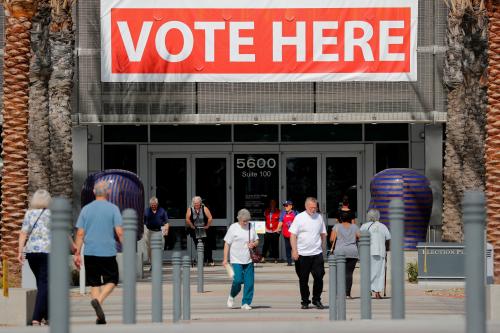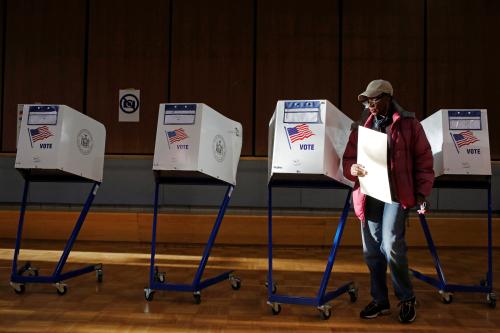Today, Americans celebrate National Voter Registration Day, a holiday established in 2012 that coincides with an effort to register hundreds of thousands of citizens to vote across the country. The work done by local organizations in this space is commendable. But research shows that, when it comes to voter registration, private action cannot be substituted for legislative change. In other countries, the primary responsibility for ensuring every eligible citizen is on the rolls falls to the government.
Registering to vote has gotten harder for Americans in recent years, as states have moved to increase barriers to registration. Two weeks ago, a judge in Tennessee struck down a law that would have imposed civil and criminal penalties, including up to $10,000 in fines and close to a year in jail, on voter registration groups that submitted too many incomplete registration forms. Opponents of the bill argued it would have a “chilling effect” on registration rates and that it specifically targeted minority voters. Since 2016, at least five other states have passed laws restricting registration practices, and many other states have additional pending legislation.
When the law in Tennessee was first passed in June, my colleague Vanessa Williamson and I wrote about its similarities to the Texas voter registration rules we encountered while running an experiment offering voter registration at free tax-preparation sites. The restrictive laws made the registration process unnecessarily arduous, substantially reducing the effectiveness of offering voter registration. Nonetheless, the results showed that offering an opportunity to register at tax time is an effective way to reach unregistered voters—especially those from underrepresented groups.
Americans view paying taxes and voting as two actions that are inherent to democratic participation. Research has shown that when Americans pay taxes to the government, they believe it should come with the right to play a role in determining how the money is spent. For families who rely on the earned income and child tax credits, tax filing can enhance feelings of citizenship and social inclusion. By giving all eligible citizens the opportunity to register when they file their taxes, the government creates an efficient elections system that strengthens democracy.
The process of connecting voter registration with tax filing has proven to be effective in other countries. In Canada, filers are prompted on their income tax form to update their voter registration. The registration process involves checking two boxes (see below), substantially reducing the red tape associated with voter registration.
Sweden makes registration automatic, with the Tax Administration maintaining a civil registration database that draws on data shared by multiple government agencies. The registry allows the administration to maintain a list of eligible voters that it sends to the Election Authority 30 days prior to each election. The Swedish and Canadian examples demonstrate how to use tax agencies to provide citizens with a simplified and automatic registration system.
However, it is unlikely that the United States will implement such an efficient registration system soon. Negative attitudes toward the IRS, logistical difficulties in government data sharing, and likely pushback from lawmakers and interest groups would dampen efforts for legislative change at the national level. Each state, however, is responsible for its own voter registration process and upkeep of the voter rolls. Additionally, 43 states have an income tax form that could be easily altered to allow eligible citizens to opt to share their information with their secretary of state or local elections office. Successful efforts to pass automatic voter registration at the state level could serve as a blueprint for such legislation.
As the 2020 elections approach and trust in government continues to weaken, visible policy solutions that connect citizens to the role they play in American democracy remain incredibly important. Allowing voter registration at tax time would serve as a yearly reminder of the personal contribution every individual makes to democracy. Perhaps next year National Voter Registration Day could be April 15.
Gavin Downing contributed to this post.






Commentary
On National Voter Registration Day, examining ways to expand voter registration
September 24, 2019